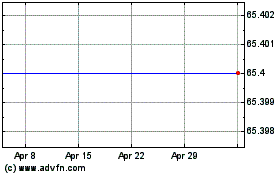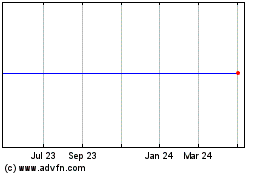DOJ Wants Tobacco Companies To Admit Their Deception
February 23 2011 - 6:03PM
Dow Jones News
Tobacco companies should admit in product warnings that they
deceived the public about the dangers of smoking and manipulated
their products to increase addiction, the Justice Department said
Wednesday.
The department, in the final phase of a long-running court case
against leading tobacco companies, released a series of statements
that it wants cigarette makers to publish about the dangers of
their products.
"We manipulated cigarettes to make them more addictive," one
proposed statement would say, while another offers this: "We
control nicotine delivery to create and sustain smokers' addiction,
because that's how we keep customers coming back."
In total, the department proposed three pages of statements that
it wants the industry to publish. Many of the proposed statements
essentially require the tobacco companies to say they deceived
Congress and the public.
The proposal comes in the wake of a 2006 decision by U.S.
District Court Judge Gladys Kessler in Washington, who ruled that
tobacco companies violated federal racketeering laws by engaging in
a decades-long scheme to deceive the public about the dangers of
smoking.
Among the penalties Kessler imposed, the judge required
cigarette makers to issue corrective statements about the dangers
of their products, to appear on television and in newspapers,
product packaging and retail displays.
The Justice Department's submission Wednesday offered the
language the agency wants included in those statements.
Lawyers for the tobacco companies did not immediately respond to
requests for comment.
The release of the proposed statements had been delayed because
the government and the industry disagreed about when the
information should be made public. Kessler ordered the information
be released on Wednesday. The companies will have a chance to lodge
legal objections to the government's proposal.
Another issue is the effect of intervening regulations by the
Food and Drug Administration. In 2009, Congress gave the FDA wide
authority to regulate the tobacco industry, including a requirement
that companies place large, graphic health warnings on cigarette
packs.
The FDA last November proposed draft warning labels that could
include graphic images depicting dead bodies and diseased lungs.
The agency's proposal is not yet final.
The Justice Department's long-running tobacco case dates back to
1999, when the Clinton administration alleged that nine tobacco
companies and two related trade associations engaged in a 50-year
conspiracy to deceive the public about the dangers of smoking. A
nine-month trial took place in 2005.
Defendants in the case include Altria Group Inc.'s (MO) Philip
Morris subsidiary; Reynolds American Inc.'s (RAI) R.J. Reynolds
Tobacco Co.; British American Tobacco (Investments) Ltd., a
subsidiary of British American Tobacco PLC (BTI); and Lorillard
Tobacco Co., a unit of Lorillard Inc. (LO).
-By Brent Kendall, Dow Jones Newswires; 202-862-9222;
brent.kendall@dowjones.com
Reynolds (NYSE:RAI)
Historical Stock Chart
From Oct 2024 to Nov 2024

Reynolds (NYSE:RAI)
Historical Stock Chart
From Nov 2023 to Nov 2024
